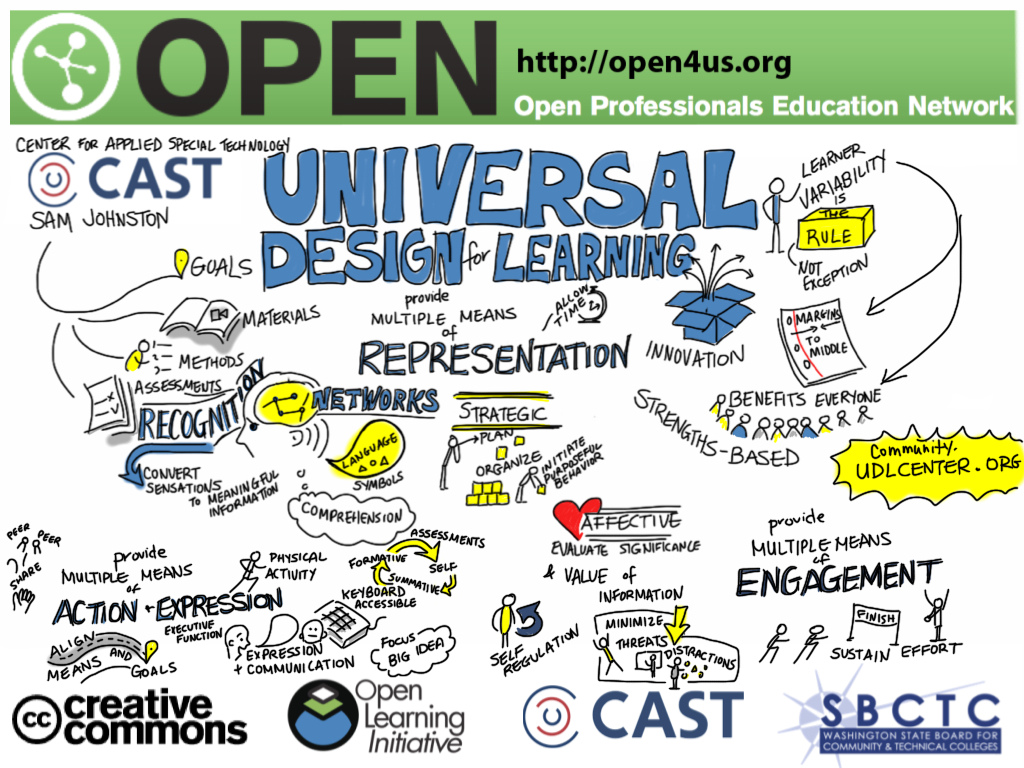
On Thursday February 22, a group of faculty and staff from City Tech and CUNY more broadly gathered to discuss Accessibility in Open Digital Pedagogy. Similar to our Fall 2015 event entitled, “Accessibility, Disability, and Open Digital Pedagogy“, this conversation approached accessibility from the frame of universal design, and asked, how can we design the college and classroom experience in ways that benefit our communities as a whole? To help facilitate discussion and provide insight, we were joined by invited guest, John Currie, Director of The Center for Student Accessibility.
Attendees brought their own ambitions to the evening’s discussion as well. One attendee was interested in thinking about the role of the human in mediating accessibility and disability practice in digital technology. Another was particularly interested in thinking about accessibility in relation to OERs (open educational resources): “How ‘open’ can an OER be if it’s not accessible?”, he asked. A related and unifying interest among the group was a desire to think about and address accommodations before they are needed; to plan and design our courses, classrooms and colleges with accessibility in mind from the get go.
The evening began with a free write and discussion about needs and accommodations in relation to our own learning, pedagogical practice and disciplinary standards. Specifically:
- Think about your optimal working/learning environment. What strategies have you developed based on how you work/learn best?
- Think about planning your courses or programs. What accommodations have you made either in general, or in response to a student self-identifying a particular need. What challenges have you faced in doing so?
- Think about your discipline. What are the unique ways your discipline approaches needs and accommodations?
Thinking about how we make accommodations for ourselves and our learning – whether finding a quiet space, cutting oneself off from the internet, annotating text, and more – and how these personal accommodations differ in pursuit of similar goals, raised questions and key points that set the tone for the evening.
In thinking about making accommodations in our classrooms, one common anxiety among participants was how to create an inclusive learning environment without overcompensating for students in damaging ways. As John pointed out, the transition from high school to college is an adjustment for all students. For students with disabilities, the transition can be further complicated by both a shift in the level of accommodation they can expect from their faculty and school, and a growing need to learn to advocate for themselves and their needs on their way to full adulthood. Stunting this growth through overaccommodation or otherwise could create future challenges farther down the road.
Ultimately, a reframing of ‘accommodation’ at both the individual and classroom level is needed. Oftentimes we approach accommodation as a process of making things easier for students. However, at an individual level, we should focus on meeting students where they are, helping them to understand the skills they currently have and creating pathways for them to consciously realize the skills they need to acquire going forward. This is true of all students. At a classroom level, the principles of universal design can be helpful. Universal design asks that, instead of making specific accommodations on a student-by-student basis in hindsight, you should prepare your course spaces, practices, and material with a broad understanding of capabilities in mind. John described this as approaching your planning and praxis with an expanded notion of normal; with the understanding that students are not made the same, that many have challenges even if they aren’t officially recognized by The Center for Student Accessibility, and that creating multiple pathways to success is a good rule of thumb. Despite planning efforts, however, we must be open to adaptation – we must expect that things will come up and changes or additions will be made; universal design is not a one and done, but an iterative process that evolves through the course of our (pedagogical) practice.
Wondering how you can apply these principles of accessibility to your OpenLab sites?
Join us for an Accessibility-a-thon on Thursday March 8th from 1:30pm – 3:30pm in A441 (smaller library classroom). We hope to see you there! RSVP
As always, thank you to everyone who was able to join us for this event, and for your contributions to the conversation! And thank you to the Faculty Commons for your generous support of this event.
We have one more Open Pedagogy event this semester on Thursday March 22nd from 5:30pm – 7:00pm. Through this event we’ll discuss open digital pedagogy in relation to our gateway courses. Stay tuned for more information!



